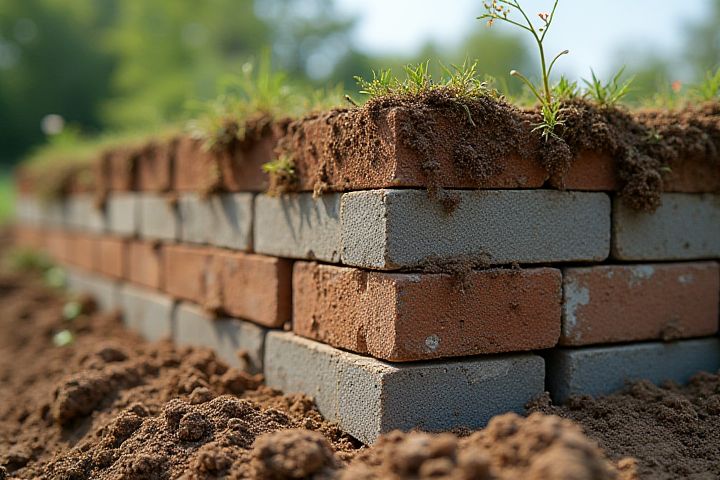
Choosing the ideal house foundation type depends on factors such as soil type, climate, and building design. Concrete slab foundations are popular for their cost-effectiveness and suitability for warmer climates, providing a solid base without the need for a basement. Pier and beam foundations elevate the home, allowing for better ventilation and access to plumbing, which can be beneficial in areas prone to flooding. For those in colder climates, a full basement foundation offers increased living space and insulation against freezing temperatures. Your choice should prioritize structural integrity and local building codes to ensure safety and longevity.
What Is The Best House Foundation Type
Slab-on-grade
A slab-on-grade foundation, which consists of a concrete slab poured directly on the ground, provides excellent stability and strength. This type of foundation is particularly advantageous in regions with minimal frost and moderate soil conditions, requiring less excavation compared to traditional foundations. With an average construction cost ranging from $4 to $8 per square foot, it is an economical choice for many homeowners. Your home may also benefit from improved energy efficiency, as the concrete slab helps maintain stable indoor temperatures.
Crawl space
A crawl space foundation elevates your home above ground level, creating a buffer against moisture and pests. Typically ranging from 18 inches to 4 feet in height, this type provides easy access to plumbing and electrical systems, facilitating maintenance and repairs. Insulating the crawl space can enhance energy efficiency, potentially reducing heating and cooling costs by up to 20%. Your choice of materials, such as concrete block or poured concrete, can significantly influence durability and construction costs, which typically vary between $7,000 and $20,000 depending on location and soil type.
Basement
The best house foundation type for a basement is typically a poured concrete foundation, which offers superior strength and durability. Poured concrete provides excellent waterproofing properties, essential for preventing moisture issues in basement spaces. Estimates indicate that homes with concrete basements may recover around 70% of their initial investment upon resale, making them a financially sound choice. You should also consider incorporating insulation and drainage systems for enhanced energy efficiency and moisture control in your basement.
Pier and beam
Pier and beam foundations offer several advantages, particularly in areas with unstable soil or high water tables. This type of foundation raises the structure above ground level, providing ventilation and reducing the risk of moisture damage, which can be crucial for durability. Typically, pier and beam foundations require at least 18 to 24 inches of clearance, allowing for easier access to plumbing and electrical systems. With proper maintenance, including regular inspections, you can ensure longevity, making it an attractive option for homeowners looking to build in challenging environments.
Concrete block
Concrete block foundations provide exceptional stability and durability, making them a popular choice for residential construction. Typically, this type of foundation is constructed using 8-inch by 16-inch concrete blocks, which offer superior resistance to moisture intrusion and soil movement. A well-built concrete block foundation can withstand loads of up to 5,000 pounds per square foot, ensuring that your home remains secure for decades. For added insulation and energy efficiency, you can also incorporate foam board or insulation within the cavities of the blocks, enhancing your home's overall comfort and reducing heating and cooling costs.
Poured concrete
Poured concrete foundations are often regarded as one of the best options due to their durability and strength. This type of foundation provides excellent resistance to moisture, reducing the risk of water damage and mold growth in your home. Additionally, poured concrete foundations can handle heavy loads, making them ideal for both residential and commercial structures. With proper installation and reinforcement, your poured concrete foundation can be a long-lasting and stable base for your building.
Hybrid foundations
A hybrid foundation combines elements of both traditional and modern foundation systems, offering enhanced stability and adaptability to various soil conditions. Typically, it includes a concrete slab reinforced with steel piers, providing strength and flexibility, crucial for areas prone to shifting ground. Many homeowners appreciate that hybrid foundations can reduce construction costs by minimizing excavation and material usage. For those investing in properties in susceptible zones, choosing a hybrid foundation can improve longevity and lower maintenance needs over time.
Helical piers
Helical piers are a highly effective foundation option, particularly suitable for homes built on unstable or expansive soil. These steel shafts, with helical plates, are drilled deep into the ground, providing exceptional load-bearing support. The design allows for precision installation, ensuring stability in both new constructions and underpinnings for existing structures. Investing in a foundation utilizing helical piers can significantly enhance your home's resilience against settlement and shifting soil conditions, with lasting durability that can exceed 50 years.
Stem wall
A stem wall foundation is a popular choice for homes built in areas with expansive soils or where water drainage is a concern. This type of foundation features a concrete wall that extends above ground level, providing excellent protection against moisture and pests while allowing for improved ventilation. Investing in a stem wall foundation enhances the structural integrity of your home, as it effectively distributes weight evenly and supports the building's load over time. Ensure proper drainage and waterproofing measures are taken to maximize the longevity and performance of your stem wall foundation.
Precast concrete
Precast concrete foundations are known for their durability and speed of installation, making them an excellent choice for residential construction. These foundations consist of concrete panels that are manufactured offsite and then transported to your location, allowing for rapid assembly and reduced labor costs. With a lifespan of over 50 years, precast concrete offers superior resistance to water and soil pressures, providing a stable base for your home. Additionally, their energy efficiency can contribute to lower utility bills, as they help maintain consistent indoor temperatures throughout the year.
